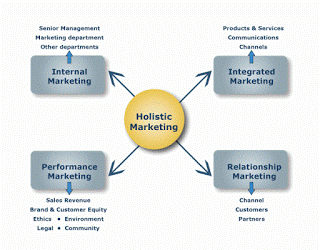Remember the concept of ‘Marketing Management Orientation’ from the book ‘Principles of Marketing’ written by ‘Philip Kotler and Gary Armstrong’.
In this marketing management orientation we learned that there are six concepts that a manager must think when he makes the marketing strategy for his/her company; Production concept, Product concept, Selling concept, Marketing concept, Societal marketing concept and Relationship marketing concept.
For a long time these concepts carry out the whole system of value delivery from product’s manufacturing to customer’s consumption and dispose of but with the continuously change in the consumer’s behavior and consumer’s intention about the products, marketers was forcefully encourage to think about something else that must satisfy consumer’s need and demand.
For this purpose, a new concept is developed and that is Holistic Marketing Concept.
Now for the complete definition of holistic marketing, I must say that “holistic marketing is a marketing concept in which we study different marketing concepts and their inter-dependencies.” Holistic marketing is the seventh concept of marketing management orientation.
According to the above definition, there are two main points in it; different types of marketing concepts and their inter-dependencies.
In holistic marketing, we use every type of marketing concept that can help to satisfy the customers and not only marketing concept but also their best combinations because with best and perfect combination of marketing concepts, either that is relationship marketing or it is societal marketing, we cannot implement holistic marketing.
A holistic marketing approach considers following points for business marketing: values, ethics, passions and concerns of the people involved in the company, processes, and goods or services as well, to select the best marketing strategy for delivering the highest value to the end customers.
There is often a unique culture in each business created by the unique set of owners and employees.
The goods or services might be very similar to other companies’ offerings but will have the unique flavor from the culture of the company.
Holistic marketing seeks to employ this uniqueness as a strategy of helping identify the specific niche from which to target end users.
Making it a truly holistic approach by looking at the whole business system in each creative marketing strategy.
This holistic approach is a very new concept introduced in business, but attract the very large number of marketers because it helps them to create value both for the buyer and seller also. In other words, it is bringing everything together.
Four main components of holistic marketing are Internal marketing, Integrated marketing, Performance marketing and relationship marketing.
From the above diagram, we can easily understand what actually these component paly roles in the holistic marketing.
Internal Marketing includes the internal management system, marketing department, and collaboration of other departments with the marketing departments.
Integrated Marketing involves the product strategy, pricing strategy, promotion strategy, and communication strategy and placing strategy.
Simply integrated marketing includes the whole basic product strategy in which managers tells how to develop and deliver the product to the customers.
Performance Marketing involves following activities like how to sell the product, what is brand and customer equity, what is legal and ethical responsibilities for company and product as well.
The last one is Relationship Marketing that includes the relationship with customers, partners, employees and competitors.
Conclusion is simple, Holistic Business Marketing looks at the whole business system to create a marketing plan.
Most Marketing strategies focus only on the service or goods provided and do not look at the people involved who create and deliver what is being marketed.
Now these days simply focus on customers and involves the whole system to generate maximum value.
